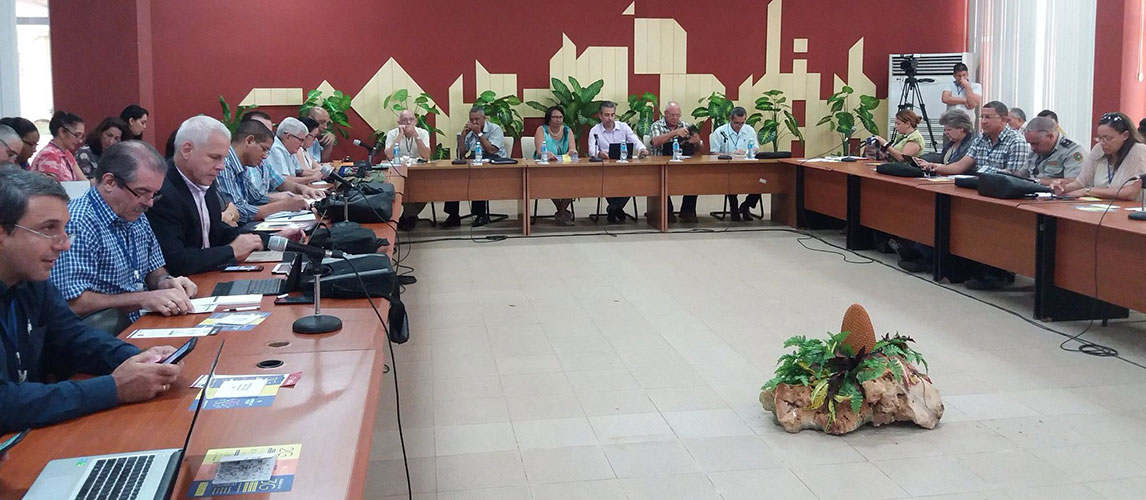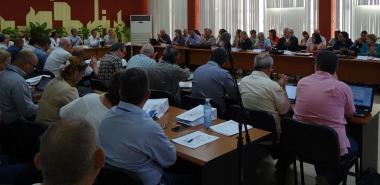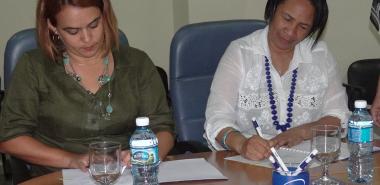The First Workshop on Computerization in pursuit of a more connected society. Photo: Rislaydi Pérez Ramos
New proposals for the Computerization of the Cuban society
The second day of the First Computerization Workshop, which takes place at the University of Informatics Sciences (UCI), began this Thursday with the status of the digitalization of public records in the country.
Francisco García, Vice-Minister of Justice, thanked our University for the organization of the event and said that together we could increasingly move forwards.
The executive stated that from the Ministry of Justice, they are developing projects so that society achieves a culture on the importance of computerization, and thus they help provide a better service to the population.
Among the main attractions to be seen this morning, there will be the presentations of the projects developed by UCI: Apklis and toDus, both applications designed to work on the mobile data network.
Ernesto Rodriguez, Director General of Informatics of the Ministry of Communications (MINCOM), presented the current state of e-government implementation in the country.
MINCOM has proposed that by 2018, all central government agencies and provincial governments should have an institutional site.
He explained the need to publish organized information and that the sites should have links to social networks.
They are implementing the possibility for the population to download documents in various formats, and for users to track the status of their procedures online.
During the debate of the first topics of the Workshop, the role of universities and their professionals in the promotion and development of applications that have functionalities for society was highlighted.
M Sc. Grisel Reyes León, president of the Computer and Communications Business Group (GEIC), said in her speech that for a better computerization of our country, the most important thing is the unity of ideas about what is going to be done according to the improvement of the population. There must be integration between all software development companies and sharing of what is happening to move forward more quickly.
She also made it known that it is necessary to evaluate which software products could be exported, always in line with the world's advances in computerization and communications technologies.
Fernando Fernández, manager of the Cuban Industrial Company for Informatics, Communications and Electronics (Gedeme), presented the new processes in which they are immersed, where the joint work with Cujae, the Young Clubs and the University of Informatics Sciences stands out.
He also talked about the use of Nova operating system in all the assembled computers, mainly laptops and mobile phones and explained the work with the ATCNEA technology classroom and the impact it has had. Fernandez also said that all products work in line with the policy of achieving technological sovereignty.
The concept of the Innovative University was presented by UCI rector, Dr. Sc. Miriam Nicado García, who explained that this university of high studies maintains Fidel's idea of being a producer and experimental teaching centre.
At the UCI, we are committed to being an innovative university that, in addition to doing science, has a strong link with the business and industrial sector, too. She also highlighted the alliances of the university with Biocubafarma, the Attorney General's Office, Etecsa and other Cuban institutions.
Nicado addressed the issue of the scientific and technological laboratories that have been developed at the University, and she extended an invitation to institutions that wish to have their laboratories at UCI: the doors are open, she said.
The director of the Support Center of our University, Allan Pierra, presented Apklis, a platform that allows downloading Cuban and foreign Android applications. You can make your search by category, download and also update. Pierra explained that this platform allows leveraging the Cuban software and achieving technological sovereignty.
Yadier Perdomo, director of Networks at this university campus, showed toDus, a Cuban platform for instant messaging and collaboration. This service allows you to share voice messages, archive images and much more in real time.
Both products are developed at UCI, in collaboration with Etecsa, to help the population be more connected and in a safer way.
After making the presentations, Pierra thanked the developers for their hard work, and also recognized the support given by the President of the Cuban Council of State and Ministers, Miguel Díaz-Canel Bermúdez for the task to be carried out successfully.
The afternoon activities began with the signing of a collaboration agreement between the Ministry of Justice and the Computer and Electronics Youth Club.
The agreement signed by Ms. María Esther Reus, Minister of Justice, and Raúl Van Troi Navarro, Director General of the Youth Club, establishes an alliance to collaborate on projects that are mutually beneficial.
Executives and officials from the General Customs of the Republic of Cuba, Onei, Citmatel, the Ministries of Culture and Agriculture and Cinesof also presented the main aspects of their work to computerize all their processes in terms of development.
The closing speech of the event was given by the Cuban Minister of Communications, Maimir Mesa Ramos, who thanked UCI for hosting the event.
Likewise he said that everything that is done in terms of computerization for companies and institutions will have a direct impact on the prosperity of the people. It is always necessary to see how much more there is and what can be done to advance technologically.
Another aspect that the Minister highlighted was related to cybersecurity and the need to increase culture in this regard.
The First Computerization Workshop closed its doors with the commitment of managers and developers to work more and better towards a more technologically updated society.






